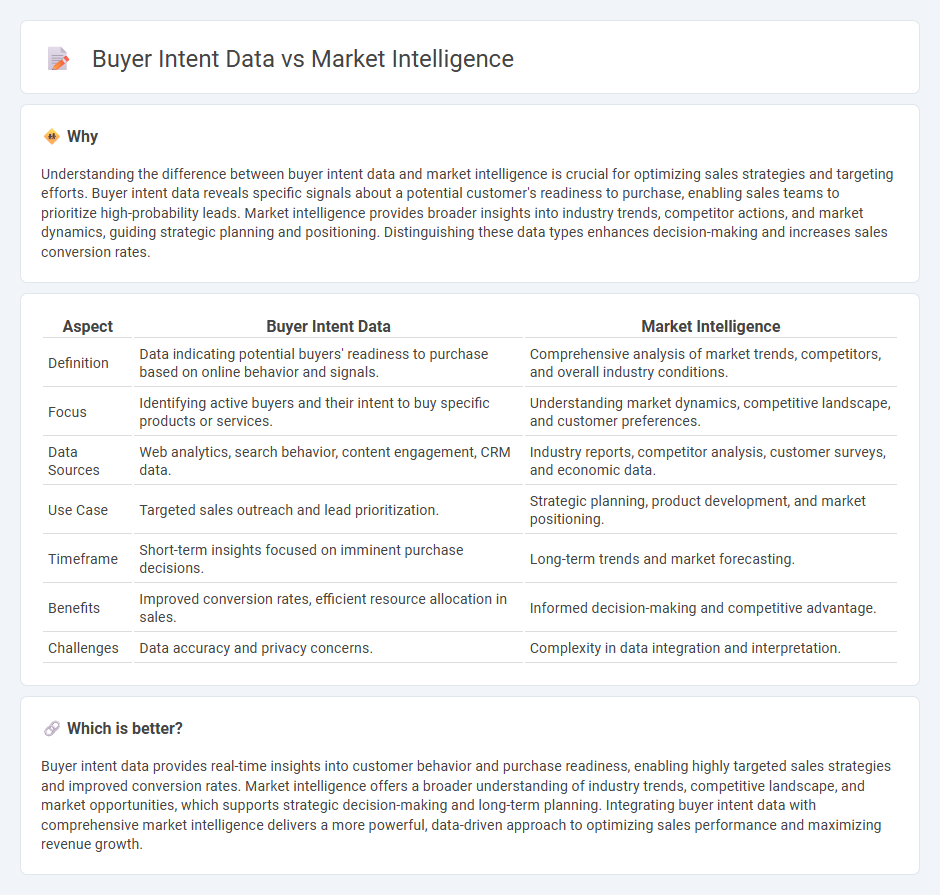
Buyer intent data captures specific signals indicating a potential customer's readiness to purchase, enabling sales teams to prioritize leads with higher conversion likelihood. Market intelligence encompasses broader industry insights, competitor analysis, and market trends that inform strategic decision-making and positioning. Explore how leveraging both buyer intent data and market intelligence can enhance your sales effectiveness and revenue growth.
Why it is important
Understanding the difference between buyer intent data and market intelligence is crucial for optimizing sales strategies and targeting efforts. Buyer intent data reveals specific signals about a potential customer's readiness to purchase, enabling sales teams to prioritize high-probability leads. Market intelligence provides broader insights into industry trends, competitor actions, and market dynamics, guiding strategic planning and positioning. Distinguishing these data types enhances decision-making and increases sales conversion rates.
Comparison Table
| Aspect | Buyer Intent Data | Market Intelligence |
|---|---|---|
| Definition | Data indicating potential buyers' readiness to purchase based on online behavior and signals. | Comprehensive analysis of market trends, competitors, and overall industry conditions. |
| Focus | Identifying active buyers and their intent to buy specific products or services. | Understanding market dynamics, competitive landscape, and customer preferences. |
| Data Sources | Web analytics, search behavior, content engagement, CRM data. | Industry reports, competitor analysis, customer surveys, and economic data. |
| Use Case | Targeted sales outreach and lead prioritization. | Strategic planning, product development, and market positioning. |
| Timeframe | Short-term insights focused on imminent purchase decisions. | Long-term trends and market forecasting. |
| Benefits | Improved conversion rates, efficient resource allocation in sales. | Informed decision-making and competitive advantage. |
| Challenges | Data accuracy and privacy concerns. | Complexity in data integration and interpretation. |
Which is better?
Buyer intent data provides real-time insights into customer behavior and purchase readiness, enabling highly targeted sales strategies and improved conversion rates. Market intelligence offers a broader understanding of industry trends, competitive landscape, and market opportunities, which supports strategic decision-making and long-term planning. Integrating buyer intent data with comprehensive market intelligence delivers a more powerful, data-driven approach to optimizing sales performance and maximizing revenue growth.
Connection
Buyer intent data captures signals reflecting potential customers' purchasing readiness, while market intelligence provides comprehensive insights into industry trends, competitor strategies, and customer behavior. Integrating buyer intent data with market intelligence enables sales teams to identify high-propensity leads, tailor personalized outreach, and prioritize efforts based on real-time demand signals. This connection enhances forecasting accuracy and drives more effective, data-driven sales strategies for revenue growth.
Key Terms
**Market Intelligence:**
Market intelligence encompasses the systematic collection and analysis of data regarding market trends, competitor activities, customer preferences, and overall industry dynamics to inform strategic business decisions. It integrates qualitative and quantitative insights from diverse sources like market research reports, customer feedback, and sales data to provide a comprehensive view of the competitive landscape. Discover how leveraging market intelligence can drive smarter strategies and sustainable growth.
Competitive Analysis
Market intelligence provides comprehensive insights into industry trends, competitor strategies, and market dynamics, enabling businesses to understand their competitive landscape thoroughly. Buyer intent data specifically tracks potential customers' online behavior and signals, allowing companies to identify high-intent prospects and tailor their outreach more effectively. Explore how integrating these tools can enhance your competitive analysis and sales strategy.
Market Trends
Market intelligence provides comprehensive insights into market trends, competitive landscapes, and consumer behavior patterns, enabling businesses to anticipate shifts and make strategic decisions. Buyer intent data offers real-time signals about potential customers' purchase readiness by tracking online behaviors, search queries, and engagement with specific content. Explore how combining both methodologies enhances forecasting accuracy and drives targeted marketing strategies.
Source and External Links
How to Develop Market Intelligence for Your Business - This article provides guidance on developing market intelligence to help businesses understand their market segment, penetration, and opportunities.
Market Intelligence and How You Should Use It - This resource covers the types of market intelligence, including competitor, product, market, and customer understanding, and how they contribute to business strategies.
What is Market Intelligence? A Practical Guide - This guide explains market intelligence as a comprehensive process providing a 360-degree view of a business environment, involving data-driven forecasts and insights into customer behavior and competitor strategies.
 dowidth.com
dowidth.com